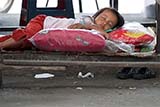Living In Thailand Blog
Tuesday 15th July 2008
How objective and unbiased can any of us be?
It's a rhetorical question aimed at myself in light of recent comments about the Preah Vihear temple dispute. I would like to think I have a balanced and unbiased view but that is never the case. I'd also like to think I am above being manipulated into how I think, but sadly that isn't the case either.
I'd never heard of the Preah Vihear temple until a few weeks ago, and now it is the biggest story in Thailand. I am in Thailand, so naturally what I hear is biased very much towards the Thai point of view.
Not only that, but during a time of continuing political turmoil the issue has been massively politicised to discredit the government and certain politicians. I live in a region of the country where people have very strong anti-government feelings, so I am constantly exposed to an extra degree of bias.
In an attempt to find out more, I came across details of the original 1962 case as judged by the International Court of Justice.
In this report, there are some interesting facts that seem to have been completed omitted by the Thai media (from what I have read) because they do not support the Thai argument.
According to Thailand now, the French were partly to blame for mapping out the area incorrectly but, according to this report, the Siamese government requested this because they didn't have adequate technical means to do this at the time. The maps (showing the temple in Cambodia) were presented to the Siamese who didn't react at the time, or for many years after.
The Thais maintain they never accepted these maps, but they continued to use them, and further, when opportunities arose to raise the matter in an international arena, they didn't.
Due to the complexity, it is completely beyond me to say who is wrong and who is right in this matter but that is not my point. The point is that for every issue we hear about, there are always many things we aren't aware of, and it is our governments and the media who decide how information is presented to us, depending on their personal agendas and political bias.
I see that after yet more violent stabbing incidents in London, there is lots of soul-searching going on in the UK at the moment. At a conference last week we heard about how there is a sense of 'tremendous hopelessness' among young people.
Similar to the 'hug a hoodie' campaign from a while ago, we are being encouraged to get out there and tell young knife-wielding gang members, "you are worth something, we love you, we want to help."
Are these people really worth something? We all have choices in life and we can choose to do things that are useful to the wider society, or not. What have they done to be worth something?
It's this crazy world we live in now where everything has been turned back-to-front and upside-down. What about doing something first to prove our worth, instead of expecting to be thought of as worth something before we have done anything worthwhile?
It's the same with so-called respect. Occasionally you hear about violence because one person didn't 'show respect' to another person. Well, what did they do to earn respect?
The other 'solution' we are hearing about is to use shock tactics by taking people caught carrying knives to meet the families of knife-attack victims. This is the kind of thing that might work with those of us who have a conscience but how much of a conscience can people have who carry knives with the intention of killing people in the streets?
I can see the argument but I rather think that liberal politicians are missing the point. In this stupid era of so-called 'political correctness', we have forgotten that everyone is different and that different kinds of people need to be dealt with differently.
It's not a problem that Asian cultures have. China has its own way of dealing with criminals and corrupt politicians, and Singapore would already have dealt with these knife murderers by now. And if they had committed their heinous crimes in Singapore, there wouldn't be people telling them, "you are worth something, we love you, we want to help."
I wonder what the parents of the French students viciously murdered in London recently think of these latest UK proposals?
I know this is a controversial subject but why should civilised people, who make up the vast majority of populations everywhere, have to live with this constant fear from a tiny minority that are out of control?
If the truth be known, I didn't feel particularly loved as a teenager either, and those years weren't the happiest of my life. But instead of joining a gang and knifing people, I learned skills to make myself useful to society later on. It was hard work and I earned very little in those years but instead of blaming society, or having feelings of hopelessness or self-pity, I just got on with it. This is how things used to be for everyone.
The trouble now is that no one has to take responsibility for their own actions. We can do whatever we want and then blame our parents, or our teachers, or our politicians, or society at large. One of the great truths of Buddhism is that we are all responsible for our own actions. Until that lesson is learnt in Western societies, and until those societies discard the culture of blame, the situation will never improve.
Monday 14th July 2008
What do Thais think about people of other nationalities?
I was speaking to a very clever, Thammasat-educated lady recently and she asked me what I thought of Thai people. My stock answer to this question is that it is impossible to generalise (even though I do it here). Take any Thai stereotype and I can show you a person who defies the stereotype.
It is the case though that over a period of time, you do notice behaviour that seems to be quite common among many people. The point to remember is that these generalisations don't apply to every single person in the country.
She told me what she believed foreigners thought about Thais and it goes back to the days of King Rama IV; a time when foreigners in Thailand were rare. It was noted then that Thais liked the good life, and liked nice things, but didn't like doing any work.
She wanted to know if foreigners still thought that. I returned to my previous point, telling her that although the description may apply to some people, it doesn't apply to them all.
She went on to tell me what Thais think about certain other nationalities. According to her: Americans like other people, the English look down on foreigners, and Germans are stingy with money. Again, I know people from all of those countries and whereas the description may apply to some, it certainly doesn't apply to them all.
Interestingly, she didn't mention the people everyone loves to hate: the French. Even the Thais - who hate no one - seem to have it in for the French at the moment.
The reason for this is that the disputed boundary between Thailand and Cambodia, which is at the root of the Preah Vihear temple controversy, was mapped out by French officers when the French were colonial masters in Indo-China.
On Thai TV news coverage of the dispute, the word farangset keeps coming up. I'm not sure how well cheese-eating surrender monkeys would translate into Thai.
Judging from some jokey e-mails I have received in the past, this anti-French sentiment appears to come mainly from the US. I've always liked France, actually, and it is one of the few European countries I think I would enjoy living in.
 From old accounts I've read, it does seem that the reputation for Thais being lazy and lethargic goes back a very long way. In this climate, however, it is hardly surprising.
From old accounts I've read, it does seem that the reputation for Thais being lazy and lethargic goes back a very long way. In this climate, however, it is hardly surprising.
Living in Thailand, I suffer from fairly frequent bouts of a quite debilitating form of fatigue. One minute, I feel fine, and the next I find myself lying down unable to do anything. It's a really horrible feeling because I like to be doing things.
Yes, I know I'm getting old, but the climate certainly doesn't help.
I called Iss a couple of days ago and she said she wasn't feeling well. When she described the symptoms, it sounded as if she was suffering from exactly the same thing. She's over 10 years younger than me, has lived here all her life, is used to the climate; but she still suffers.
Thais do seem to sleep a lot more than most other people. When I was taken out last weekend, there were grand plans at the start of the day but straight after lunch I could see that my Thai companions were overcome with tiredness so that signalled the end of our day out.
A while back, I read up on dehydration and the symptoms of mild dehydration are very similar to what I have described. It only takes a minor amount of fluid loss in the body to start making us feel fatigued. I therefore started to drink lots of water, plus a glass or two of electrolyte each day, to make up for the fluid I lose through sweat.
On the day that Iss didn't feel well, I called her again in the evening. She said she felt great. She attributed this sudden recovery to drinking something called Hale's Blue Boy. It's a sickly sweet syrup sold in glass bottles that is very popular in Thailand.
The Thais have a sweet tooth and they use it on desserts, and to pour over shaved ice to make a sweet drink. It can also just be mixed with water. On Iss's advice, I have just bought a bottle to see if it helps. It comes in various flavours and my bottle is red.
If it helps, I will write more here.
Onomatopoeic words make so much sense. The Thai word for cat is exactly the same sound as that made by Thai cats. Unfortunately, the common word for dog is more like the sound made by a sheep or a goat (if you use a wobbly voice). Wouldn't it be great if instead of maa or soo-nuk, the Thai word for dog was woof?
Confusingly, moo is pig (or pork). Think how much easier it would be for foreigners if beef was moo, pork was oink, duck was quack, etc. It's just a thought.
แมว - cat (maew) mid-tone
แม้ว - northern Thai hilltribe (normally written Meo) high-tone
Incidentally, Meo (as in northern hilltribe) is one of the nicknames the Thais have given to Thaksin; and it goes without saying that they refer to his football club as Meo City.
A little incident this evening reminded me of a few of the other stereotypes Thais, especially less-educated Thais, have of foreigners.
In no particular order; all foreigners (without exception): are incredibly wealthy; love Phuket; drink copious amounts of alcohol; adore small, dark-skinned girls from Isaan.
Not only are they incredibly wealthy, but they are also incredibly stupid. They know nothing about Thailand; know nothing about how much anything should cost; can't understand any of the spoken language; and they certainly can't read Thai.
On the basis foreigners don't know what anything should cost, unscrupulous Thais have a perfect right to try to rip them off; and on the basis they can't understand anything, ill-mannered Thais are perfectly free to talk about foreigners right in front of them. They are also allowed to make any other assumptions they wish, whether these assumptions are right or completely wrong.
For my evening meal, I fancied a change to the usual so wandered around one of those areas in which farangs very rarely venture. You can always find foreigners in the shopping malls and big supermarkets but it is unusual in this particular area where there are just traditional rice and noodle shops.
It's also quite grubby, which is something else that deters many foreigners. You won't find anything written in English and it is unlikely you will meet any Thais who can speak English with any degree of proficiency.
Most places there don't have normal menus; they just write the menu on a big board. As I was looking around, I stopped at one place to see what they had. Everything was pork and I stopped eating pork in Thailand quite a long time ago so I was about to move on. I had been looking at the board for about 20 seconds or so, I guess.
Just as I was about to leave, one of the women working there told her friend I couldn't read, "aan mai ohk". I could have just let it go but I was annoyed.
If a Thai was standing there, would she just have made personal comments about that person to her friend? I doubt it very much, but they do it all the time with foreigners because they assume foreigners can't understand anything. I was also annoyed because her assumption was wrong.
I've been teaching myself to read Thai for about four years now. I don't claim I can read passages of text because I can't. The rhetorical style of written Thai is very different to the spoken language and it's a tough skill to master. But signs, place names, destinations, and menus are a breeze.
It's no big deal and I'm certainly not the only foreigner in Thailand who can read basic Thai. I know foreigners who have contacted me through this site who can read, or are in the process of learning.
Something else I get fairly often is being asked if I can read Thai after spending a few minutes looking at a Thai only menu. "No, of course I can't, but I just like looking at the funny writing."
I could have walked off but I asked her, in Thai, who it was that couldn't read. Next, I proceeded to read her menu back to her. Was I being arrogant, big-headed, or showing off? Not really - I just had a point to make to her. I then asked her again who couldn't read. I made a point of speaking very politely, in order to make her feel worse.
By this time, she had slunk off and was trying to hide behind her friends. She wouldn't reply, and she wouldn't even look at me. Big loss of face. Good. She deserved it - som naam naa. Perhaps next time she sees some foreigners wandering around she might think first and show some manners.
Sunday 13th July 2008
Last week, a friend invited me to go with her and some friends to a local waterfall today. I've been once before but quite a long time ago. It's a local beauty spot and fairly scenic.
As soon as she mentioned it, I had doubts because of the dual pricing system. There's no way I'm going to pay Bt400 when Thais pay Bt40. Anyway, I gave it some more thought and decided I would go, but I would take along my Thai driving licence plus the card with my tax number, attempt to speak Thai, and insist on paying the local price. This strategy has worked for me in the past.
The arrangement was that I would call her back if I wanted to go, which I did this morning. However, she told me the trip has been cancelled because ... wait for it ... the weather is too hot. Mmmmm.
What was she expecting? If she had asked, I could have told her exactly what the weather would be like today. In fact, I could tell her exactly what the weather will be like every day for the next two or three months. Hot. It's always bloody hot! Paula Fisch from Channel 9 would be the ideal weather forecaster for southern Thailand. Every day is scorchio!
You'd think that having being born in the south of Thailand, she might have realised this by now but apparently not.
As I said yesterday, you have to do things here in spite of the heat. If you decide not to do things because it is too hot, you will only be active for about five days a year.
Thais are so funny at times.
The expatriate community in Thailand is certainly a mixed bag and noticeably different compared to somewhere such as Singapore.
In Singapore, the primary focus for most expats is work. Of course, the lifestyle is what most of them are there for in the first place, but that is only achievable by being good at something and having a good job because it's an expensive place in which to live. You can't be a jobless bum in Singapore and expect to survive for very long.
The difference in Thailand is that many foreigners are there primarily for the lifestyle; and work (if they work at all) is just something they are forced to do to enable them to live that lifestyle.
I've met some fantastic expats in Thailand but generally they have all been very successful people. They were successful before they came to Thailand, and they are successful in Thailand.
There's a 73 year-old professor working at the university who I sometimes eat lunch with. He and his wife have lived and worked on several continents working in various academic institutions; and they are among the most travelled people I have ever met. They are both very intelligent people, and good at what they do. He's also a very amusing guy and is never short of a humorous anecdote.
When you talk to them, it is obvious they have worked hard to get where they are but they thoroughly enjoy what they do and there is no jealousy or resentment at all towards other people. If you can meet people like this in Thailand, you are lucky.
There's another type of expat in Thailand that is very different. These are the single males who have never been successful in life. They've never had a decent job and were probably social outcasts in their home countries.
They get a taste for the cheap beer and bar girls in Thailand and decide that's what they want. However, they don't really have enough money. Job opportunities for foreigners are quite restricted in Thailand and unless you have a unique skill that is in high demand, for most people it means teaching English.
Some are incapable. Some bluff their way through but there is nothing more soul-destroying than doing something you can't really do, and doing it just for the money. Not having been successful in their previous lives, they don't have any other sources of income and find that what they can earn in Thailand is barely enough to get by on.
They are very jealous and resentful of other foreigners in Thailand who are obviously more successful. The 'bitter and twisted farang' is not a rare species in Thailand.
Mostly, they ignore other foreigners but there is a seething resentment under the surface. Go to any public Internet forum about any subject related to Thailand and you will see evidence of the 'bitter and twisted farang'.
It would be good to include a forum or message board here, or to make my 'blog' into a proper 'blog' where people could leave comments, but it is only too predictable what would happen so those things won't be happening. I've seen what happens elsewhere once the bitter and twisted farangs get going with their poison keyboards.
Sometimes this bitterness and resentment bubbles over into more personal attacks. About four years ago, I was walking along minding my own business and a farang I didn't know - and who I hadn't even made eye contact with - launched into one of the most abusive verbal attacks I have ever experienced.
Quite shocked, I turned around to see the most hateful look I have ever seen in a human being's eyes. The guy obviously had massive psychological problems and I had just walked past at the wrong time. Had it not been me, he would have vented his anger at another foreigner.
For some, the problems get so bad that they can't face life any longer. When they realise that abusing other foreigners, or trying to make other people's lives worse in whatever way they can, doesn't actually make their own lives any better, they throw themselves off tall buildings. This is a fairly common occurrence with foreigners living in Thailand.
If you have a web site and write about Thailand, expect abusive attacks now and again from 'bitter and twisted farangs'. You just have to ignore it though and feel sorry for the people responsible because by now they could just be a splattered mess somewhere on a Thai pavement.
What is a shame is that because there are so many mentally unbalanced foreigners in Thailand, I tend to be wary of all foreigners and sometimes I almost miss out on meeting good people. There's not a lot you can do though. Thailand, being the country it is, will always attract lots of undesirable foreigners.
The good news is that the immigration clampdown that began almost two years ago has started to remove a lot of undesirables from the country. There's a long way to go yet, but the situation is gradually improving.
And yes, there was another minor incident today, which is the reason for this little outburst.
There was another great search engine query yesterday that resulted in someone arriving at one of my pages:
"massage parlors in thailand that won't show up on your bank statement"
Just pay cash, my friend; pay cash and your wife will never find out! She might notice those unsightly warts though so be careful where you dip your wick. STDs can be highly contagious and once in your body the HPV virus never leaves, so you will have the condition for the rest of your life.
Saturday 12th July 2008
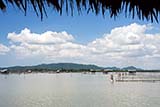 As I mentioned last week, I am going to try to personalise what I write here in an effort to try to make this a little different to the other 10,000 blogs about Thailand. I have my own views on what is happening in the political arena but we can all read newspapers.
As I mentioned last week, I am going to try to personalise what I write here in an effort to try to make this a little different to the other 10,000 blogs about Thailand. I have my own views on what is happening in the political arena but we can all read newspapers.
The photos should also give an idea of my lifestyle. It's a lifestyle that seems to be different to the majority of foreigners living in Thailand but it is one I enjoy. As I have stated before, there is no way I could live in a major tourist resort area with thousands of other foreigners, and although Bangkok has a multitude of things to do and see, it is a little too chaotic for me these days.
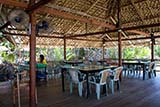 Even so, the longer I am in Thailand, the more I find myself suffering from cabin-fever. My opportunities to travel are fairly limited due to work commitments. Consequently, I can't go very far on my days off and I have been to most places within easy striking distance.
Even so, the longer I am in Thailand, the more I find myself suffering from cabin-fever. My opportunities to travel are fairly limited due to work commitments. Consequently, I can't go very far on my days off and I have been to most places within easy striking distance.
The constant intense heat presents another quite significant barrier. Often, I want to go somewhere but just don't want to go outside when it is so hot. Not only does it make me physically uncomfortable but it also drains me of energy very quickly.
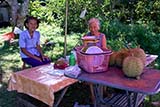 Nonetheless, staying in my room writing this rubbish or preparing lesson plans during my days off isn't healthy for the body or the mind so there are times when I have to force myself to go somewhere. Once I get going, I enjoy it, but actually getting out can be a real effort at times.
Nonetheless, staying in my room writing this rubbish or preparing lesson plans during my days off isn't healthy for the body or the mind so there are times when I have to force myself to go somewhere. Once I get going, I enjoy it, but actually getting out can be a real effort at times.
Yesterday, I went to Yo island near Songkhla. The island is joined to the mainland at each end by the longest bridges in Thailand and forms part of a major highway in the south. Lots of traffic passes through but very few people stop. If they did, they would discover that it is a pleasant and interesting little place.
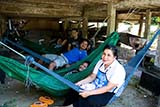 The main occupations are fishing and fruit farming. Many people seem to grow fruit and old ladies sell their produce by the side of the road. In addition, there is a small but quite well-known weaving industry in which all the weaving is done on old-fashioned handlooms. There are also a number of very pleasant seafood restaurants.
The main occupations are fishing and fruit farming. Many people seem to grow fruit and old ladies sell their produce by the side of the road. In addition, there is a small but quite well-known weaving industry in which all the weaving is done on old-fashioned handlooms. There are also a number of very pleasant seafood restaurants.
At one end of the island is the Institute for Southern Thai Studies which used to be known less formally as the Southern Thai Folklore Museum. Set on top of a hill, it's in a great location and there are lots of things of interest inside.
 I didn't visit the museum yesterday but just spent time wandering around meeting some of the local people and chatting with them. That's one of the things I like doing most in Thailand.
I didn't visit the museum yesterday but just spent time wandering around meeting some of the local people and chatting with them. That's one of the things I like doing most in Thailand.
The island is located near to some fairly busy places but you would never know it. It feels like it is a million miles away from city life and the peace and tranquility on the island is very welcome.
It's also a bit like stepping back in time when visiting places like this in Thailand. The living is easy and there is none of the hustle and bustle of normal modern-day life. It's the kind of lifestyle that many Thais, Bangkokians especially, have already forgotten about ... unfortunately for them.
 My lunch was fish again. Somehow, it seems a bit of a crime to go to places like this where there are big fishing industries, and lots of fresh, cheap, delicious fish ... and to choose chicken.
My lunch was fish again. Somehow, it seems a bit of a crime to go to places like this where there are big fishing industries, and lots of fresh, cheap, delicious fish ... and to choose chicken.
I fancied sweet and sour and asked the waitress which kind of fish would be best. She suggested bplaa ga-pong. This is a snapper but there are many varieties and I don't know what kind of snapper it was. Where's our fish expert, Samak, when you need him?
Anyway, it was very good and there was a lot of it. I left the restaurant feeling quite stuffed.
As you can see from the photos at the top of the page, I had the restaurant to myself and it was located in a very attractive setting on the edge of the lake. The girl in the photo is the waitress, not another customer. The food was good, the views were pleasant, and it wasn't expensive. Nutritionally, this kind of meal is also very good, with a plate of fresh vegetables on the side.
It's not a bad life.
Friday 11th July 2008
So, Noppadon has resigned but it wasn't a big surprise after members of his staff were seen packing his belongings earlier in the week. Of course, he "never did anything wrong, and he only resigned because he loves his country so much, and national unity is far more important than his political position, and blah blah blah."
Where have we heard all this before, I wonder? His position had become untenable and he was also desperate to get out of the firing line. Why can't Thai politicians just admit they screwed up - or got caught - instead of trotting out the same old lies and rhetoric?
Thailand currently feels like a rumbling volcano that is about to go off with an almighty eruption.
One of the staff where I work gave me a lift a few days ago and his radio was tuned into an anti-government demonstration in Bangkok. I have heard quite a few radios tuned into the same kind of thing. When Thais start talking about politics to me now, they look as if they are going to burst into tears, or explode in a fit of rage.
While having dinner last night, I was watching TV in the restaurant and all I saw was news about the Preah Vihear temple. I had previously underestimated the strength of feeling that exists in Thailand about this issue.
I have been told that people in Sisaket province are crying in the street about the UNESCO decision, and it is obvious that Thais are very, very angry. This is noticeable because anger is an emotion that isn't usually demonstrated publicly in Thailand.
Jai yen yen - staying calm with a cool heart - is normally the order of the day but Thais are very much jai rawn (hot-hearted) right now.
The timing is quite uncanny. Noppadon and Samak are not exactly the most popular people in Thailand right now, and this has all blown up just as Thaksin starts to face corruption charges. The three men are very closely linked, of course.
Thaksin was refused permission to leave the country recently with court cases against him pending. Had he done so, I think he might have been quite reluctant to return to Thailand given what is happening now. Sword of justice hangs by a thread over Thaksin.
In many ways, I am pleased about what is happening because certain people are starting to get what they deserve but there is something quite disturbing about seeing this level of anger in Thailand because it's just not normal.
I love the non-confrontational aspect of Thai culture but it has often occurred to me that Thais don't have a very effective safety valve mechanism to let off steam. They put up with a lot and don't complain, but anger and frustrations tend to build up.
What then happens is that when they reach their breaking point, the red mist descends. I've witnessed this a few times and it isn't pleasant. There are a lot of people baying for various other people's blood at the moment and they are whipping up a frenzy that could get out of hand quite quickly.
It is difficult to tell right now what will happen next. The decisions against Thaksin in the coming months will be key. If justice isn't seen to be done, that will then be the catalyst for further problems.
Whatever people think about him, the one thing that is undeniable is that he is probably the most divisive politician Thailand has ever seen. He has torn Thailand apart and that is as good a reason as any to make sure he can never again have political influence in the country.
It just didn't happen after the coup two years ago. Even during a period of self-imposed exile - and while serving a five year ban from politics - he carried on exactly where he left off, except that he operated through proxies and nominees. He is the root cause for all of Thailand's political problems and he has to be stopped for good otherwise this political turmoil will never end.
To add to Samak's current woes, he is also in hot water for continuing to host a TV cooking show for which he gets paid Bt80,000 a month. Even as a main source of income that wouldn't be a bad salary in Thailand but for him of course, as Prime Minister, it's just pocket money.
I mentioned earlier in the week that I am no expert when it comes to fish. Samak, on the other hand, is an expert. For a long time, whenever I saw news items about him on TV he was wandering around traditional Thai fresh markets inspecting fish, fruit and vegetables.
This is what he does outside of work, and when he is working he sits there making paper birds. This has to be one of those 'Only in Thailand' things.
In the UK it would be like Gordon Brown popping up on BBC1 after Prime Minister's question time to host 'Cooking Highland-style with Gordon'. "And this week Gordon will be showing us his grandmother's recipe for haggis, neeps and tatties."
"Och, Sarah, would ya mind passing the wee sheep's stomach?"
If a trend is started here, we could even be treated to George Dubbya showing us how to prepare genuine Rocky Mountain Oysters on his Texas ranch.
Then again, having these muppets run TV cooking shows while allowing people who actually know what they're doing to run our countries probably wouldn't be a bad thing.
To be a true TV chef, Gordon Brown - like his fellow countryman and namesake, Gordon Ramsay - would need to learn to be more foul-mouthed, but that is not an area in which Samak needs any coaching. Included in the long list of criticisms against him are his combative style and abrasive language - the latter, especially, being something that Thais are very sensitive to.
There's a fairly large woodland bird I see from my room quite often, known as a Greater Coucal (Centropus sinensis). I know what it's called from my bird guides but what I'm not so sure about is how to pronounce the name. I have never heard 'Greater Coucal' spoken by anyone.
Is the 'ou' in 'Coucal' pronounced the same as the 'ou' in 'soup' or the 'ou' 'loud'? What about the letter 'c', of which there are two. Is it like the 'c' in cat, or the 'c' in ceiling, or perhaps the 'c' in cello? Perhaps the two c's in one word are pronounced differently, as in 'cyclical' or 'cynical'?
Brits like to laugh at Americans. Oh yes, where was I? Brits like to laugh at Americans for not being able to pronounce place names like Leicester and Gloucester correctly, but how do Americans know with such a dumb spelling system?
Sometimes it's done just for snobbish reasons; to indicate that people who 'know' the special pronunciation belong to some kind of elite, inner circle. The Oxbridge colleges of Magdalen (or Magdalene), for example. Zzzzzzzzzz .....
In general, Thai is better in this respect but there are still a number of exceptions to the rules, along with some other difficult areas.
Take the vowel -ำ
For tone rule purposes, it is considered long but normally it is a fairly short -um, as in som-dtum. In the Thai word for water or liquid, however, it is a long 'aam' sound.
น้ำ
I asked one Thai girl about this and she told me it was because the second tone mark is used. However, the Thai word 'to repeat' or 'do again' also uses this tone mark and, as far as I know, it has a short -um sound.
ซ้ำ
Both words begin with low class initial consonants and use the same tone mark. The tone rules for both words are identical, and they should rhyme, but one is 'naam' and the other is 'sum'.
The vowel เ is another example.
It has a distinct ay sound in the Thai word for 'time' (way-laa)
เวลา
But more of an 'e' sound in the Thai word for 'play' (len)
เล่น
The biggest problem for me personally though, with regard to reading Thai, is implied vowels. With words that are spelt using a series of consecutive consonants and no written vowels, it is not always obvious if there are implied vowels, or not, and, if so, what sound they make.
This is a subject I will cover here later.



